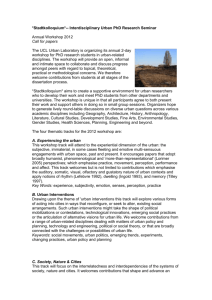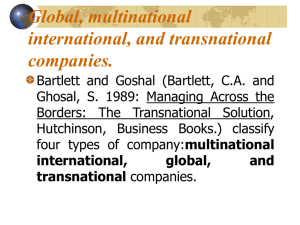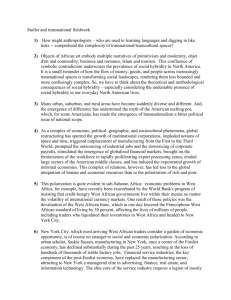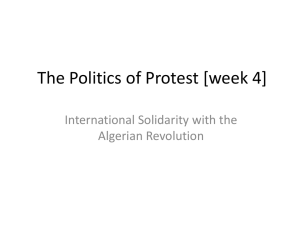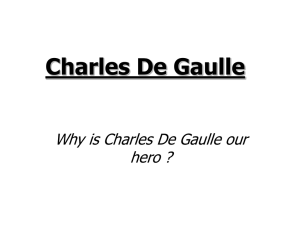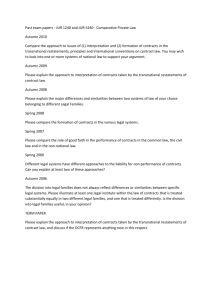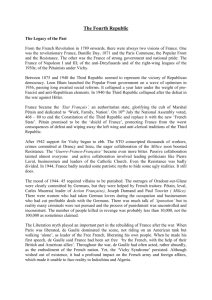Twentieth-Century France - Institute of French Studies
advertisement
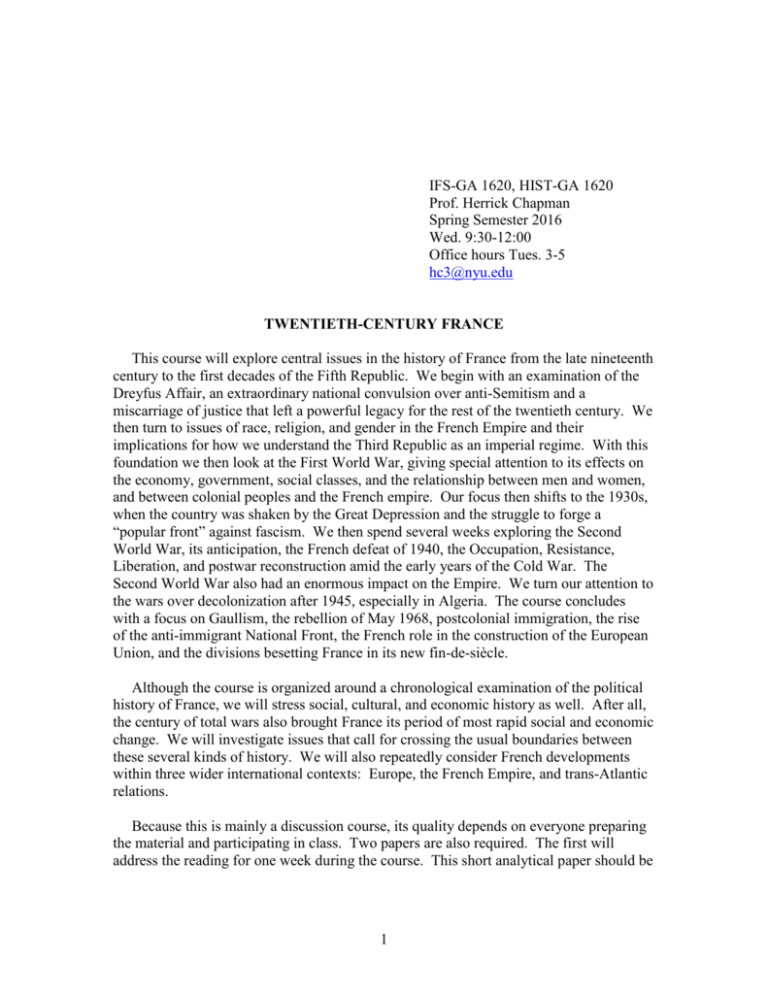
IFS-GA 1620, HIST-GA 1620 Prof. Herrick Chapman Spring Semester 2016 Wed. 9:30-12:00 Office hours Tues. 3-5 hc3@nyu.edu TWENTIETH-CENTURY FRANCE This course will explore central issues in the history of France from the late nineteenth century to the first decades of the Fifth Republic. We begin with an examination of the Dreyfus Affair, an extraordinary national convulsion over anti-Semitism and a miscarriage of justice that left a powerful legacy for the rest of the twentieth century. We then turn to issues of race, religion, and gender in the French Empire and their implications for how we understand the Third Republic as an imperial regime. With this foundation we then look at the First World War, giving special attention to its effects on the economy, government, social classes, and the relationship between men and women, and between colonial peoples and the French empire. Our focus then shifts to the 1930s, when the country was shaken by the Great Depression and the struggle to forge a “popular front” against fascism. We then spend several weeks exploring the Second World War, its anticipation, the French defeat of 1940, the Occupation, Resistance, Liberation, and postwar reconstruction amid the early years of the Cold War. The Second World War also had an enormous impact on the Empire. We turn our attention to the wars over decolonization after 1945, especially in Algeria. The course concludes with a focus on Gaullism, the rebellion of May 1968, postcolonial immigration, the rise of the anti-immigrant National Front, the French role in the construction of the European Union, and the divisions besetting France in its new fin-de-siècle. Although the course is organized around a chronological examination of the political history of France, we will stress social, cultural, and economic history as well. After all, the century of total wars also brought France its period of most rapid social and economic change. We will investigate issues that call for crossing the usual boundaries between these several kinds of history. We will also repeatedly consider French developments within three wider international contexts: Europe, the French Empire, and trans-Atlantic relations. Because this is mainly a discussion course, its quality depends on everyone preparing the material and participating in class. Two papers are also required. The first will address the reading for one week during the course. This short analytical paper should be 1 five to six pages long. The final paper (due May 12) should be twelve to fifteen pages on a topic of your own choosing. Grading in the course will be as follows: Class discussion Short paper Final paper 30% 20% 50% Articles and documents for required reading are available on the NYUClasses website. Books for required reading are available for purchase at the NYU Bookstore and are on reserve at Bobst Library. These books include: Tyler Stovall, Transnational France: The Modern History of a Universal Nation (Boulder, CO: Westview Press, 2015). Michael Burns, ed., France and the Dreyfus Affair (New York: St. Martin’s, 2000). The Journal of Hélène Berr (in either the English or French edition). Leonard V. Smith, Stéphane Audoin-Rouzeau, and Annette Becker, France and the Great War, 1914-1918 (Cambridge and New York: Cambridge University Press, 2003). Class Schedule Week 1 (Jan. 27) – Introduction Stoval, Transnational France, chs. 3-5. Week 2 (Feb. 3) – The Dreyfus Affair Stoval, Transnational France, ch. 5. Michael Burns, ed., France and the Dreyfus Affair. Herrick Chapman and Laura L. Frader, “Race in France,” in Race in France: Interdisciplinary Perspectives on the Politics of Difference, 1-19. Ruth Harris, Dreyfus: Politics, Emotion, and the Scandal of the Century, 135-68. Steven Englund, “Antisemitism, Judeophobia, and the Republic,” in The French Republic: History, Values, Debates, ed. Edward Berenson, Vincent Duclert, and Christophe Prochasson (Ithaca: Cornell University Press, 2011), 278-88. Week 3 (Feb. 10) – The Third Republic as Empire Stovall, Transnational France, ch. 6. 2 Alice Conklin, “The Civilizing Mission,” in The French Republic: History, Values, Debates, ed. Edward Berenson, Vincent Duclert, and Christophe Prochasson, 173-81. Raoul Girardet, L’Idée coloniale en France de 1871 à 1962 (Paris: Hachette, 1972), 77107. Edward Berenson, Heroes of Empire: Five Charismatic Men and the Conquest of Africa (Berkeley: University of California Press, 2011), intro., ch. 5. Lynn E. Palermo, “Identity Under Construction: Representing the Colonies at the Paris Exposition Universelle of 1889,” in The Color of Liberty: Histories of Race in France, ed. Sue Peabody and Tyler Stovall, 285-301. Véronique Hélenon, “Races, statut juridique et colonisation: Antillais et Africains dans les cadres administratifs des colonies françaises d’Afrique,” in L’esclavage, la colonisation, et après…, ed. Patrick Weil and Stéphane Dufoix, 229-43. Week 4 (Feb. 17) – The First World War Stovall, Transnational France, ch. 7. Leonard V. Smith, Stéphane Audoin-Rouzeau, and Annette Becker, France and the Great War, 1914-1918. Éric Deroo, “Dying: The Call of the Empire (191301918),” in Colonial Culture in France since the Revolution, ed. Pascal Blanchard, Sandrine Lemaire, Nicolas Bancel, and Dominic Thomas, 132-39. Tyler Stovall, “The Color Line Behind the Lines: Racial Violence in France during the Great War,” American Historical Review 103, 3 (1998): 737-69. http://ezproxy.library.nyu.edu:2063/stable/pdfplus/2650570.pdf Week 5 (Feb. 24) – Gender and Race in Interwar France Stovall, Transnational France, ch. 8. Mary Louise Roberts, “Samson and Delilah Revisited: The Politics of Women’s Fashion in 1920s France,” American Historical Review 98, 3 (June 1993): 657-84. http://ezproxy.library.nyu.edu:2063/stable/pdfplus/2167545.pdf?acceptTC=true Victor Margueritte, The Bachelor Girl, selected pages. Elisa Camiscioli, “Intermarriage, Independent Nationality, and the Individual Rights of French Women: The Law of 10 August 1927,” in Race in France: Interdisciplinary Perspectives on the Politics of Difference, ed. Herrick Chapman and Laura L. Frader. 3 Pascal Blanchard and Éric Deroo, “Paris, a Colonial Capital (1931-1939),” in Colonial Culture in France since the Revolution, ed. Pascal Blanchard, Sandrine Lemaire, Nicolas Bancel, and Dominic Thomas, 196-306. Jennifer Boittin, “The Militant Black Men of Marseille and Paris,” in Black France/France Noire: The History and Politics of Blackness, ed. Trica Danielle Keaton, T. Denean Sharpley-Whiting, and Tyler Stovall, 221-46. Week 6 (Mar. 2) – Fascism and the French Far Right Robert O. Paxton, “The Five Stages of Fascism,” Journal of Modern History 70, 1 (March 1998): 1-23. René Rémond, The Right Wing in France from 1815 to de Gaulle, 273-99. William D. Irvine, “Fascism in France and the Strange Case of the Croix de Feu,” Journal of Modern History 63, 2 (June 1991). Vicki Caron, “French Public Opinion and the ‘Jewish Question,’ 1930-1942: The Role of Middle-Class Professional Associations,” in Nazi Europe and the Final Solution, ed. David Bankier and Israel Gutman (Jerusalem: The International Institute for Holocaust Research, 2003), 374-410. Begin reading The Journal of Hélène Berr. Week 7 (March 9) – Vichy’s National Revolution and Life in Occupied France Stovall, Transnational France, ch. 9. Finishing reading The Journal of Hélène Berr. Robert Paxton, Vichy France: Old Guard and New Order, 51-63,136-45, 210-20, 33052. Philippe Burrin, France under the Germans: Collaboration and Compromise, 177-209. Richard Vinen, The Unfree French: Life under the Occupation, 157-81. Philippe Pétain’s speeches of 17 June 1940. “Marshall Pétain and the ‘New Order’,” Foreign Affairs 19, 3 (April 1941). E-text: Philippe Pétain’s speech of 12 August 1941 http://www.ibiblio.org/pha/policy/1941/410812a.html 4 Texts of Vichy laws regarding the status of Jews. Week 8 (March 23) – Resistance and Liberation Charles De Gaulle’s speeches of 18 June 1940, 6 June 1944, 25 August 1944, and 2 February 1945. Marc Bloch, Strange Defeat, 126-78 (“A Frenchman Examines His Conscience”) Julian Jackson, France: The Dark Years, 1940-1944, chapter 20 “Resistance in Society,” 475-505, 601-32 H. R. Kedward, In Search of the Maquis: Rural Resistance in Southern France 19421944 (Oxford: Oxford University Press, 1993), 73-115. Program of the Conseil National de la Resistance, reprinted in Peter Novick, The Resistance versus Vichy: The Purge of Collaborators in Liberated France. Jean-Paul Sartre, “The Republic of Silence.” Claire Duchen, “Opening Pandora’s Box: The Case of Femmes tondues, in Problems in French History, ed. Martyn Cornick and Ceri Crossley (New York: Palgrave, 2000), pp. 213-32. Jane Jenson, “The Liberation and New Rights for French Women,” in Behind the Lines: Gender and the Two World Wars, ed. Margaret Randolph Higonnet et al. (New Haven: Yale University Press, 1987), 272-84. Mary Louise Roberts, “The Silver Foxhole: The GIs and Prostitution in Paris, 19441945,” French Historical Studies 33, 1 (Winter 2010): 99-128. Week 9 (Mar. 30) – Reconstruction: Postwar France as a New Society? Stovall, Transnational France, ch. 10. Sophie Lamri, “’Algériennes’ et mères françaises exemplaires (1945-1962), Le Mouvement social 199 (April-June 2002): 61-91. Jean-Pierre Rioux, “Mendésisme or “Poujadisme?” in The Fourth French Republic, 1944-1958, 245-53. Gabrielle Hecht, “Peasants, Engineers, and Atomic Cathedrals: Narrating Modernization in Postwar France,” French Historical Studies 20, 3 (1997): 381-418. Rosemary Wakeman, The Heroic City: Paris, 1945-1958, 106-61. 5 Kenny Cupers, The Social Project: Housing Postwar France, ch. 4. Week 10 (Apr. 6) – Postwar as Colonial War Martin Evans, “Algeria and the Liberation: Hope and Betrayal,” in The Liberation of France: Image and Event, eds. H.R. Kedward and Nancy Wood. John Ruedy, Modern Algeria: The Origins and Development of a Nation (Bloomington: Indiana University Press, 1992), chapter 6. Albert Camus, Resistance, Rebellion, and Death (New York: Modern Library, 1963), 81-115. Frantz Fanon, “Unveiling Algeria,” in A Dying Colonialism (New York: Grove Press, 1965). Mouloud Feraoun, Journal 1955-1962: Reflections on the French-Algerian War (Lincoln, NE: Nebraska University Press, 2000), ix-xiii, xl-xlv, 84-87, 152-53, 248-52, 294-98, 309-15. Judith Surkis, “Ethnics and Violence: Simone de Beauvoir, Djamila Boupacha, and the Algerian War,” French Politics, Culture & Society 28, 2 (Summer 2010): 37-55. http://ezproxy.library.nyu.edu:2111/ehost/pdfviewer/pdfviewer?sid=854cb7ef-44474567-a839-f5ef9bcda9b2%40sessionmgr14&vid=4&hid=15 Film: Gillo Pontecorvo, “The Battle of Algiers” Week 11 (April 13) – The Algerian War and the Creation of the Fifth Republic Stovall, Transnational France, ch. 11. Michel Winock, “De Gaulle and the Algerian Crisis, 1958-1962,” in De Gaulle and Twentieth-Century France, ed. Hugh Gough and John Horne (London: Edward Arnold, 1994), 71-82. E-text: Speech by Charles de Gaulle in Constantine, Algeria, October 3, 1958 http://www.fordham.edu/halsall/mod/1958degaulle-algeria1.html Todd Shepard, The Invention of Decolonization: The Algerian War and the Remaking of France, chs. 8 and 9. Joshua Cole, “Remembering the Battle of Paris: 17 October 1961 in French and Algerian Memory,” French Politics, Culture & Society 21, 3 (Fall 2003). Irwin M. Wall, France, the United States, and the Algerian War, 229-68. 6 Week 12 (April 20) – The French Sixties and the Rebellion of May ‘68 Required: Stovall, Transnational France, ch. 12. Andrew Feenberg and Jim Freedman, eds., When Poetry Ruled the Streets: The French May Events of 1968, 81-91, 123-28, 147-63. Julian Jackson, “De Gaulle and May 1968,” in De Gaulle and Twentieth-Century France, eds. Hugh Gough and John Horne (London: Edward Arnold, 1994), 125-46. “Rethinking May 68,” in May ’68: Rethinking France’s Last Revolution, ed. Julian Jackson, Anna-Louise Milne, and James S. Williams, 3-16. Xavier Vigna, “Beyond Tradition: The Strikes of May-June 1968,” in May ’68: Rethinking France’s Last Revolution, ed. Julian Jackson, Anna-Louise Milne, and James S. Williams, 47-57. Daniel Gordon, “Reaching Out to Immigrants in May 68: Specific or Universal Appeals?” in May ’68: Rethinking France’s Last Revolution, ed. Julian Jackson, AnnaLouise Milne, and James S. Williams, 93-108. Michael Seidman, The Imaginary Revolution: Parisian Students and Workers in 1968, 115, 272-85. Kristin Ross, May ’68 and Its Afterlives, 1-18,182-215. Richard Jobs, “Youth Movements: Travel, Protest, and Europe in 1968,” American Historical Review 114, 2 (April 2009). http://ezproxy.library.nyu.edu:2142/ehost/pdfviewer/pdfviewer?sid=ad41fd4c-56964df8-b4ab-ef3a10eb5e7a%40sessionmgr4&vid=4&hid=13 Week 13 (Apr. 27) – France after “Les Trente Glorieuses” Christophe Bonneuil, Céline Pessis, and Sezin Topçu, “Pour en finir avec les “Trente Glorieuses,” in Une autre histoire des “Trente Glorieuses”, ed. Bonneuil, Pessis, and Topçu, 5-31. Emile Chabal, A Divided Republic: Nation, State and Citizenship in Contemporary France, selected chapters. Jim Shields, “The Front National since the 1970s: Election Impact and Party System Change,” in France Since the 1970s: History, Politics and Memory in an Age of Uncertainty, ed. Emile Chabal. Week 14 (May 4) – Research Presentations and Course Wrap-Up 7 Papers due 5 p.m. Thursday, May 12. 8


